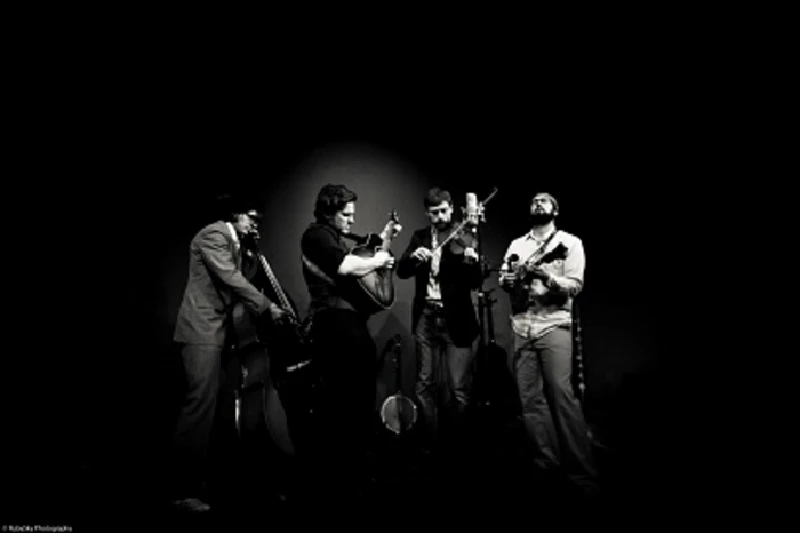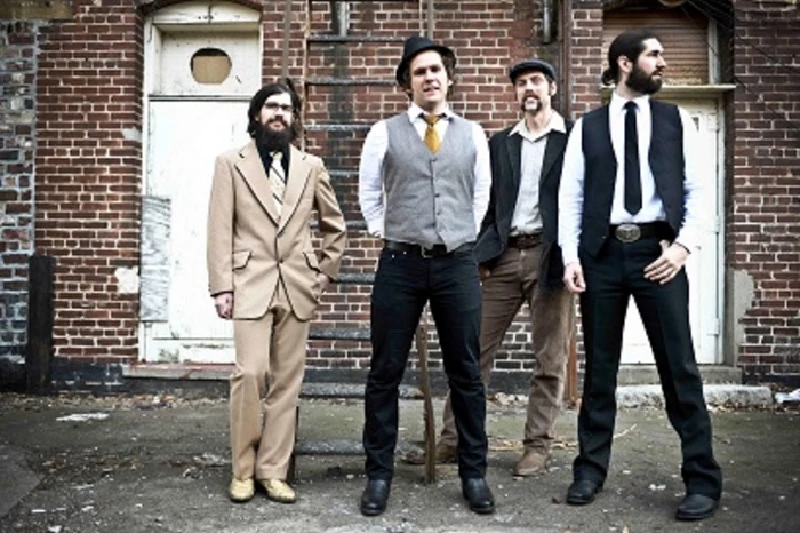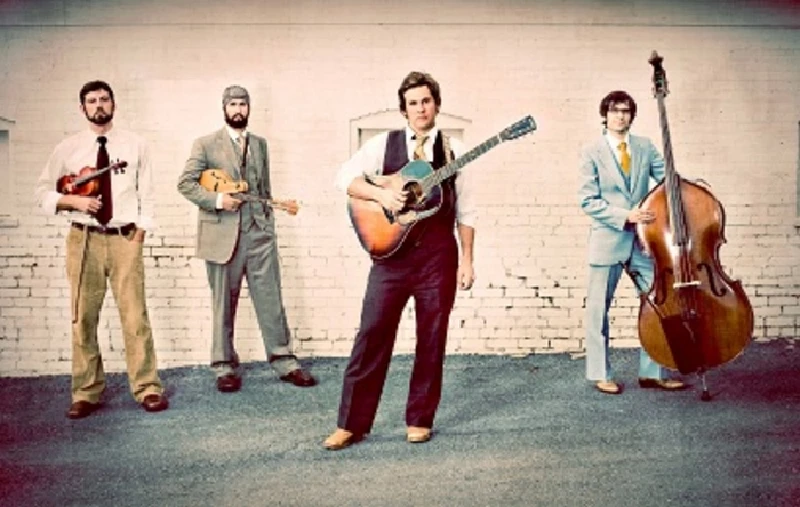Steel Wheels - Interview
by Lisa Torem
published: 16 / 2 / 2012

intro
Lisa Torem speaks to Trent Wagler from acclaimed Virginia-based folk-country band the Steel Wheels about their latest album ‘Lay Down Lay Low’ and the group's bluegrass and roots influences
Lead vocalist and primary songwriter of Harrisonburg, Virginia-based the Steel Wheels, Trent Wagler, was born in Bean Blossom, Indiana, but later moved to the Shenandoah Valley where he explored the area’s rich, cultural landscape. His truthful singing has drawn comparisons to John Fogerty, and the other members of the quartet, who also sing, frequently rely on harmonies to textualize their traditional roots and original tunes. Wagler and mandolinist, Jay Lapp, continue to perform as a duo in Ireland, while the four major players frequent major American and Canadian festivalss because they “rarely get a chance to be in the same place at the same time” with their touring colleagues. These festivals have included Roots On The River, Ocrafolk and Riverbend. In addition the band annually participates in a bicycle tour, ‘Spokesongs’ where they have been known to clock more than 500 miles in ten days. In 2010, The Steel Wheels garnered seven nominations in the Independent Music Awards including Best Country Song for ‘Nothing You Can’t Lose.’ Now, a veteran of ten years, Trent discusses his career with the band, including the frightening event that triggered the concept for their new album, ‘Lay Down Lay Low’, and the variety of bluegrass-edged music that inspires their performances. PB: ‘Lay Down Lay Low’ was inspired by what might have been a tragic act. Can you talk about that incident and what you mean by the phrase, “the good struggle”? TW: The tragic act you're referring to is when my good friend, Keith, had a plan to go to the New River Gorge Bridge in West Virginia and jump off that bridge to his death. In the end he decided to step off the bridge and walk back to his truck and drive home. I find that to be an inspiring story, perhaps a metaphor for anybody who is trying to live a life of their choosing that they build from the ground up in a world that is pushing harder and harder from the top down on all of us. In the midst of economic crisis, lay-offs and just the difficult spectre of raising a family and doing it in a way that you believe in, I think the good struggle applies to anyone willing to choose hope in the face of disaster. PB: It seems like standard Steel Wheels protocol to include a few instrumentals on each recording. ‘Nola’s First Dance’ and ‘Fridley’s Gap’, on the new album, are both stunning, but completely different in style. How did they come about? And, in general, how did you choose which songs to include for the album? TW: The process for choosing songs to record comes down to what songs really stick when we are playing live. With this album, we had at least six or seven tunes I proposed that didn't make the cut. I think, in terms of the instrumentals or the a cappella or the ballads, we just want to create a set of songs that fit together, but they're not going to sound the same. We like playing songs that are in different styles. We make no bones about trying to stretch ourselves stylistically and this album definitely does that from ‘Nola's First Dance’, that has a bit of an Irish lilt and ‘Fridley's Gap’ that feels more like a straight-ahead fiddle tune with a bit of bluegrass style. But we've also got some Cajun and funk inspired sounds on the album. We want to make music that we would want to listen to, and we like the sounds of old, raw Gospel, and we like the sounds of rock 'n roll and blues, and really anything that comes through our player eventually makes it into our fingers and into the songs we write. PB: You and Jay Lapp were the original band members and you shared similar backgrounds. But before you added Eric Brubaker on fiddle and Brian Dickel on bass and vocals did you two create a vision for the band or did it occur organically? TW: We didn't have a formal sit-down business plan or anything, but I think the reason there was so much energy when Jay and I got together was because we shared a certain vision. We fell in love with the partnership of Jerry Garcia and David Grisman from the Grateful Dead. We loved te vision that we saw there, and we wanted to be a part of something like that. Jerry brought rock passion and David brought virtuosic energy to traditional music. We also wanted to write our own songs, and we wanted them to be honest to who we are and tell stories to people who would listen. We tried to stay true to that vision and, as we created this band, it tries to hold true to these basic ideas. PB ‘Rain In the Valley’ is done a cappella, as was ‘Surround Me.’ How do you orchestrate your vocal harmonies and how long does the process usually take? TW: It depends on the song. With ‘Surround Me’, I wrote the song and recorded myself singing lots of harmonies, and that became the basic arrangement we started from. With ‘Rain in the Valley’, it was a couple sessions of hearing the basic melody and working together with the voices we have to start creating harmonies. Everybody in the band grew up singing harmony, and we've sort of taken it for granted that when we are arranging new songs it's fairly easy to divvy out parts and get something orchestrated. PB: Your grandfather came from an Amish background and played harmonica. Did you have a chance to play with him as you were growing up or to hear about stories from his youth? TW: Yes, I have played with my grandfather especially in the past ten years. It's been a good way to get to know him, as I've become an adult. Several songs on our 2010 album, ‘Red Wing’, were inspired by my relationship with my grandfather. He had stories growing up Amish, of secretly learning to play guitar and playing with a band. The Amish community didn't allow any instruments besides the harmonica, so playing the guitar in a band was an act of rebellion. Grandpa eventually left the Amish community because of some of these differences in opinion. I had a chance to record my grandpa and I played some songs just for safekeeping - nothing professional – and, now that he's in a pretty advanced stage of dementia and getting close to the end of his life, I'm very grateful to have had the opportunity to get to know him in that way. I'll never forget the way he first lit up when he heard himself coming through the speakers. "We sound pretty good," he said. "Just as good as some of those tapes we have back at the house." PB: Prior to the new album, your discography included traditional numbers like ‘Red Wing’ and ‘Working on a Building.’ Both songs have been widely covered, but were there versions that captivated you? And, as on the new record you feature originals, will you move away from the more traditional tunes in the future? TW: The ‘Red Wing’ song also was inspired by my grandpa. He always played that tune on the harmonica. I wrote the lyrics that we used in the ‘Red Wing’ album. They were not the old traditional lyrics about the Indian maiden. We have a great respect for traditional songs and will continue to play them as a part of our shows, but with this new album we are very excited to be presenting original material and predominately original material at our shows. When we do a traditional song, it's always important to us to bring something new to it and hopefully we've been able to do that when we've played ‘Shady Grove’ or ‘Working on a Building.’ PB: You have recorded songs that discuss Native American culture. ‘Indian Trail’ has these lyrics: “My heart is heavy, feet don’t fail/I want to run from the Indian Trail.”‘Red Wing’ is about an Indian maiden whose lover dies in battle. Has Native American history and folklore greatly influenced you? TW: I am very fascinated by the history of this country and Native American peoples as a part of that. The song ‘Indian Trail’ comes from a road that runs near where I live in Virginia. Indian Trail is a road that runs through a bit of a valley and there's also a railroad right next to it. I figure, wherever there is a road, a railroad, and it's called Indian Trail, that must be a place with a lot of history. I like to imagine all the possible stories that have gone on along this little route. It happens to be a road that I love to ride my bicycle on. There's nothing better than imagining the different parts of history that may have played out right as you're riding past those rolling hills. PB: Since 2005, the Steel Wheels have produced an album a year, except in 2007. Has that been part of the plan or incidental? TW: We follow our own timelines when it comes to releasing albums. Since we’re not contracted with any big label or don't have outside pressures, we have to be our own motivation. It usually happens that we have enough songs and we've played enough of the last batch of songs that, by the time a year rolls around, we're ready to record and evolve a little. I think each album is a little bit of metamorphosis. You're not exactly sure what the butterfly is going to look like. PB; Jay Lapp lists his influences as everything from Mennonite hymns to Creedence Clearwater Revival. How do your influences compare to his? TW: Influences musically range from the Mennonite hymnbook to Nirvana and Pearl Jam. Add Townes Van Zandt and Tom Waits to Del McCoury, and my grandfather. PB: What strengths do Eric Brubaker and Brian Dickel bring to the band? TW: The main thing both Eric and Brian provide to the band is a tasteful glue to every sound. They both are amazing musicians in their own right, but they know when to play a note and when to leave it quiet. That's the mark of a great musician truly. PB: Has geography influenced your writing? The Blue Ridge Mountains, they say, are very beautiful. TW: You'll hear a lot of references in the songwriting to geographic influences. The mountains, the rivers, the valleys have provided a palette for artists in this region for centuries. When you live in an area of great musical tradition, it sometimes feels like you ride the current as you write. The strings really resonate differently. PB: The band has played a variety of festivals, some well known, like the Kerrville Folk Fest, and some more obscure to people outside of the regions, such as the Albino Skunk Music Festival. How do you rank your experiences at these festivals, and do you have any special stories you would like to share? TW: The Albino Skunk Music Festival is a great example of passionate music lovers putting together a beautiful musical experience. We've played huge stages and we've played small festivals and there is no easy answer to which is greater. I got to sit with the Gibson Brothers at the Albino Skunk Festival backstage and visit with them and share stories while some of my band mates played ‘Gin and Juice’ with the Gourds on stage. Another example of that was, early on when Jay and I played an opening slot for Peter Rowen at a festival in Northern Ireland, and we got to sit and drink Guinness with Peter at the hotel after the festival was over. PB: What are The Steel Wheel’s future goals? TW: Immediately, we just want to get this album released. Long-term, we want to become friends and resources for people all across the country, maybe the world, playing our music and drawing from deep traditions while trying to create something new, using stories and songs that play to people's imaginations. If that means on Merle Fest main stage or that means somebody's small concert series, we are happy to play the songs for audiences who will listen. PB: Thank you, Trent.
Picture Gallery:-


most viewed articles
current edition
Spear Of Destiny - InterviewRobert Forster - Interview
Fiona Hutchings - Interview
When Rivers Meet - Waterfront, Norwich, 29/5/2025
Carl Ewens - David Bowie 1964 to 1982 On Track: Every Album, Every Song
Brian Wilson - Ten Songs That Made Me Love...
Chris Wade - Interview
Shrag - Huw Stephens Session 08.12.10 and Marc Riley Session 21.03.12
Pistol Daisys - Waterfront, Norwich, 29/5/2025
Credits - ARC, Liverpool, 17/5.2025
previous editions
Heavenly - P.U.N.K. Girl EPBoomtown Rats - Ten Songs That Made Me Love....
Barrie Barlow - Interview
Oasis - Oasis, Earl's Court, London, 1995
Manic Street Preachers - (Gig of a Lifetime) Millennium Stadium, Cardiff, December 1999
Dwina Gibb - Interview
Chuck Prophet - Ten Songs That Made Me Love...
Pixies - Ten Songs That Made Me Love...
David Paton - Magic: The David Paton Story
Sound - Interview with Bi Marshall Part 1
most viewed reviews
current edition
Peter Doolan - I Am a Tree Rooted to the Spot and a Snake Moves Around Me,in a CircleGarbage - Let All That We Imagine Be The Light
Vinny Peculiar - Things Too Long Left Unsaid
Little Simz - Lotus
John McKay - Sixes and #Sevens
Suzanne Vega - Flying With Angels
HAIM - I Quit
Morcheeba - Escape The Chaos
Vultures - Liz Kershaw Session 16.06.88
Billy Nomates - Metalhorse
Pennyblackmusic Regular Contributors
Adrian Janes
Amanda J. Window
Andrew Twambley
Anthony Dhanendran
Benjamin Howarth
Cila Warncke
Daniel Cressey
Darren Aston
Dastardly
Dave Goodwin
Denzil Watson
Dominic B. Simpson
Eoghan Lyng
Fiona Hutchings
Harry Sherriff
Helen Tipping
Jamie Rowland
John Clarkson
Julie Cruickshank
Kimberly Bright
Lisa Torem
Maarten Schiethart